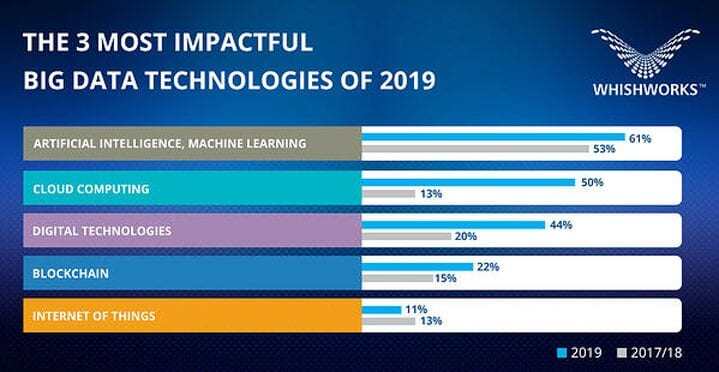For our second flagship report on the State of Big Data in the UK 2019, we asked data strategists, architects and users which technologies they see impacting their business the most. Although Artificial Intelligence and Machine Learning remain at the top of the list of the most impactful Big Data technologies, this year we see an impressive rise in cloud computing (50% from 13%) and digital technologies (44% from 30%).
Artificial Intelligence & Machine Learning
In the past year we’ve seen a tremendous increase in the number of companies that look into Artificial Intelligence and Machine Learning as a means to optimise processes, improve profitability and gain a sustained competitive advantage:
- Real-Time Decision Making. With Artificial Intelligence and Machine Learning companies can transform large data sets into actionable insights. This information can be integrated into everyday business processes and operational activities to respond to changing market demands or business circumstances in real-time.
- Process Automation. Artificial Intelligence and Machine Learning technologies apply predictive models to data points that change in real-time, delivering decision support and executing automated tasks accordingly, bringing unprecedented accuracy and speed to Labour intensive, repetitive tasks.
- Security. Cyber-security threats have increased exponentially over the past few years, becoming ever more sophisticated. With Artificial Intelligence and Machine Learning companies can monitor network behaviour for anomalies in real-time. More importantly, as Machine Learning algorithms self-train, the cyber-security improves continuously.
- Improved Business Models and Services. Every day we hear about the success stories of innovative companies that leveraged Artificial Intelligence and Machine Learning to become market leaders -companies like Uber, AirBnB and Amazon are classic examples. The level of automation, real-time processing and granular analysis that Artificial Intelligence and Machine Learning provide, can empower companies to reinvent their offerings and business models, and gain the much-needed competitive edge.
- Operational efficiencies. With Artificial Intelligence and Machine Learning, companies can automate customer interactions across different channels, including email, online chat, social media and telephone. Moreover, where real-time communication is required, like in investment banking or transport, AI-based applications enable instant updates to high volumes of customers.
Cloud computing
We briefly touched upon the role of cloud computing in creating modern enterprise data architectures. Cloud computing offers significant benefits:
- Reduced IT costs. Moving to cloud computing can reduce the cost of managing and maintaining an on-premise Big Data infrastructure.
- Scalability. With cloud computing you can scale up or down your data processing and storage needs, allowing flexibility as your needs change.
- Business continuity. Having your data stored in the cloud ensures it is backed up and protected, and therefore, when disaster happens, you can quickly return to business as usual, minimising any downtime and loss of productivity.
- Accessibility. If your business is spread across different locations, and/or requires close collaboration with various partners, a cloud environment facilitates cooperation and data sharing in a controlled and secure manner.
If you decide to move your data to the cloud you should consider the following issues:
- Make sure you have the necessary privacy and service level agreements in place to safeguard against certain risks and outline the responsibilities of each party.
- Understand how your data will be stored and secured, including any access control and security measures in place by the service provider.
- Cloud computing service providers may have storage spanning multiple servers (sometimes in multiple locations). Investigate where your data is being stored and which privacy and security laws will apply to the data.
Digital
Undeniably we are living in the era of digital economy, where increasingly economic activities and commercial transactions are enabled by digital computing technologies. For businesses to remain competitive, being able to navigate effectively in the digital economy is imperative, and digital technologies are seen in 2019 as one of the top three areas where Big Data professionals expect to have the most impact in their organisation. In fact, digital technologies together with cloud computing showed the biggest increase from last year (44% from 20%).
Unlike machine learning, cloud computing or blockchain, the adoption of digital is largely driven by customers. Customers demand high-quality communication through the internet and social media. They also expect engaging content and online experiences, as well as innovative, mobile commerce tools and applications. For businesses across industries, keeping up with digital technologies and incorporating them into their day-to-day business is essential if they want to enhance business practices, increase productivity and grow revenue. The key components of a digital strategy should include:
- online presence
- digital marketing
- e-Commerce
- unified customer experiences across channels
- mobile applications
- online security
- supply chain digitalisation




